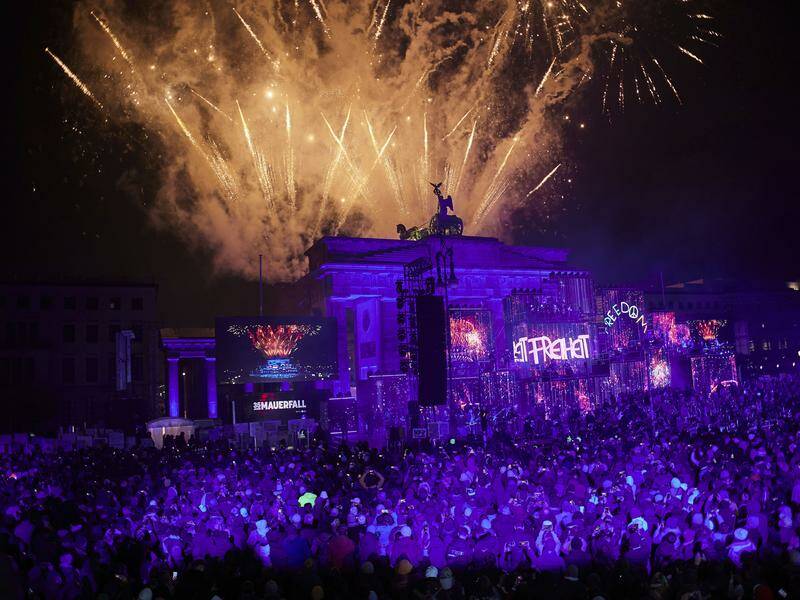Berlin Marks 35th Anniversary of Berlin Wall’s Fall with Calls to Preserve Freedom

Germany commemorated the 35th anniversary of the fall of the Berlin Wall on November 9, celebrating the triumph of freedom and democracy while reflecting on the challenges these values face globally.
Constructed in 1961, the Berlin Wall was more than just a concrete barrier; it was a stark representation of the global ideological struggle between communism and democracy. Erected by East Germany’s communist government, the wall was intended to prevent East Berliners from fleeing to the more prosperous and free West. Over its 28-year existence, the wall became a grim symbol of division, complete with armed guards, watchtowers, and a “death strip” to deter escape attempts.
Three and a half decades later, the fall of the Berlin Wall remains a powerful reminder of humanity’s yearning for freedom and unity. It serves as a lesson in the importance of resilience, peaceful protest, and international solidarity in overcoming tyranny.
In Berlin, the anniversary is being commemorated with exhibitions, concerts, and discussions reflecting on the wall’s historical significance and the challenges of building a unified Germany. At the Berlin Wall Memorial, visitors from around the world are paying tribute to those who lost their lives seeking freedom and celebrating the courage of those who fought for change.
Chancellor Olaf Scholz released a video message to mark the occasion, describing the historic moment as “a victory for all of Europe.” He praised the pro-democracy movements across Eastern Europe that preceded the wall’s collapse in 1989, calling it a turning point in the continent’s history.
Leaders Highlight the Legacy of Freedom
Berlin Mayor Kai Wegner and President Frank-Walter Steinmeier spoke at the Berlin Wall Memorial, where thousands gathered to honor the anniversary.
“Hold freedom aloft, for without freedom, nothing else matters,” Wegner said, reflecting the motto of the memorial display. He emphasized that “freedom and democracy were never matters of course,” warning that these principles remain under threat.
Wegner also described November 9 as a “fateful day” in German history, pointing to both its joyful and tragic moments. While it marked the fall of the Berlin Wall in 1989, it is also remembered for the horrors of Kristallnacht in 1938.
President Steinmeier laid flowers at the memorial alongside Economy Minister Robert Habeck, paying tribute to those who fought for unity and freedom. Scholz called the fall of the wall “a lucky day for which we Germans are still grateful today.”
A Symbol of Division and Triumph
The Berlin Wall, constructed in 1961, stood as a stark reminder of Cold War tensions, dividing East and West Berlin for nearly three decades. Erected by the East German government, it was intended to prevent citizens from fleeing to the democratic West. Over its 28-year existence, the wall became a global symbol of oppression and division.
Its fall on November 9, 1989, was spurred by mass protests and a weakening Soviet grip on Eastern Europe. That night, after a mistaken announcement about eased border controls, thousands of East Berliners flocked to the wall, overwhelming guards and prompting its opening. Scenes of joyous reunions and citizens dismantling the wall with sledgehammers captivated the world.
Global Celebrations and Reflections
In Berlin, the anniversary was marked with open-air concerts, art installations, and discussions under the theme “Preserve Freedom!” The events were held against the backdrop of ongoing conflicts in Ukraine and Israel, underscoring the fragility of democracy worldwide.
Fragments of the Berlin Wall, preserved as reminders of its legacy, remain in Germany and across the globe. One piece resides at the National Museum of American Diplomacy in Washington, D.C., signed by former German Chancellor Angela Merkel, who grew up in East Germany.
In the words of former U.S. President Ronald Reagan, whose famous speech at the Brandenburg Gate in 1987 demanded, “Mr. Gorbachev, tear down this wall!”—the anniversary is not just a reflection on the past but a call to action for the future.
A Call to Action
The anniversary serves as both a celebration and a call to action. Wegner highlighted the enduring message of the 1989 revolution: “Courage, confidence, and solidarity pay off. Against each other, we achieve nothing; we’re only strong together.”
As Berlin commemorates this milestone, leaders and citizens alike are reminded that the fight for freedom and democracy is ongoing. Chancellor Scholz’s words echo this sentiment: “The victory of freedom in the fall of 1989 was a win for all of Europe—and its lessons remain vital today.”
The events of 1989 continue to inspire a global commitment to unity and the enduring power of collective action in the face of division.